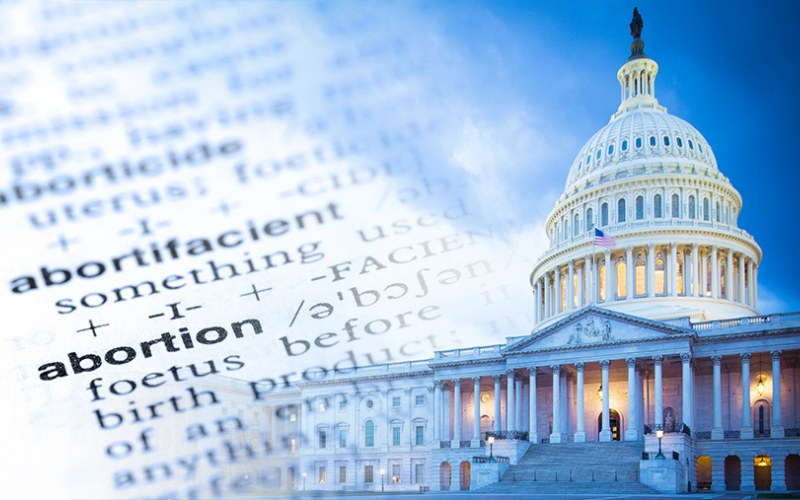More than 150 state and national pro-life groups wrote to Congress this week urging lawmakers to cut Medicaid funding for "Big Abortion."
"In November, the American people gave a mandate," the letter begins. "It is time for change in Washington."
Despite adopting weaker language in the party platform in the 2024 campaign season, Republicans have been a sympathetic audience and have put forth legislation that aligns with pro-life concerns.
They heard more voices Thursday, when hundreds of pro-lifers allied on Capitol Hill.

Though majorities are slim, Republicans currently control both the House and Senate, and Quena Gonzalez, director for government affairs for Family Research Council, told Washington Watch after the gathering he believes there is a real chance that the Planned Parenthood Federation of America (PPFA) could take a big hit from its plethora of federal funding sources.
Planned Parenthood received roughly $700 million in federal funds in 2024, reports show.
"This could actually happen for the first time really since 2017," he told show host Tony Perkins. "We have a fighting shot at taking away almost $700 million a year at last count from America's biggest abortion providers."
Representative Chris Smith (R-New Jersey) agrees and says congressional leadership wants to get this done as part of the budget reconciliation process, which would negate filibuster efforts by Senate Democrats.

"If we have the courage … we could be close with a couple of votes," Smith told Perkins. "Hopefully, people will be persuaded to put this into the reconciliation package, which does not require a supermajority on the Senate side, so the filibuster has no power over this initiative."
"Our leadership is very committed," he added.
Ryan Helfenbein, vice president of communications at Liberty University, said on American Family Radio Friday that a big funding cut for Planned Parenthood likely has bipartisan support.
H.R.271, the Defund Planned Parenthood Act of 2025, was introduced in the House in January by Michelle Fischbach (R-Minnesota) and has 54 Republican co-sponsors.
It prohibits providing federal funding for PPFA or its affiliates for a period of one year unless they certify they will not perform and will not provide funds to entities that perform abortions during that year.
If the certification requirement is not met, then the Department of Health and Human Services and the Department of Agriculture must recoup any federal assistance received by those entities.
The funding restriction does not apply to abortions performed in cases of rape or incest or when necessary to resolve a physical condition that endangers a woman's life.
The bill also provides additional funding for community health centers for the one-year period. These funds are subject to the same abortion-related restrictions and exceptions.
The influence of Planned Parenthood
No abortion services provider is bigger than Planned Parenthood.
It performs more abortions than any other U.S. provider, accounting for roughly 35% of abortions nationwide. The group receives millions in funding from a number of federal government sources, typically more when Democrats hold the congressional purse strings and occupy the White House.
Aside from performing abortions, Planned Parenthood is a major political player for the cause, spending an estimated $70 million in support of pro-abortion candidates and ballot measures last year alone, Fox News reported.
Arizona, Colorado, Missouri, Maryland, and Montana voted to add abortion rights to their state constitutions last year.
It is a double whammy for pro-lifers; their tax dollars fund abortion and work to ensure that babies are aborted for years to come.
Helfenbein pointed out that even some Democrats oppose this.

"This is something that many, many conservatives, and I would even say those who are on the other side of the aisle [want]," he said. "This is a majority issue where many Americans will agree that they do not want to see their personal tax dollars being used to promote or provide abortion services."
Congress can dictate federal funding for abortion, but Medicaid is different. Individual states have the authority to expand or restrict Medicaid coverage beyond the federal reach. Some states add their own funds to Medicaid to enhance abortion availability.
Helfenbein told show host Jenna Ellis the proposed legislation is "a good first step" but hardly enough to defeat an entrenched abortion machine like Planned Parenthood.
The one-year limit on guaranteed defunding does not go far enough.
"Lest we forget, Planned Parenthood has been around for a very, very long time, and they have relied upon federal dollars to come into their coffers and support their mission of death," Helfenbein said. "That's exactly what they're doing. They do not provide healthcare services."
99% of Planned Parenthood's work is abortion related, he said.
Winning hearts and minds on the issue
Though a weak point in the bill, Helfenbein said the one-year timeframe could be part of a larger working plan, a measured approach to winning hearts and minds on the abortion issue.
In a year's time, smaller Planned Parenthood-tied clinics who rely on federal funding could close, or others could be prosecuted for defying the law, he posed.
"Just like tariffs, which … are not supposed to be permanent actions, this is leveraged temporarily," Helfenbein offered. "Since June 24th, 2022, when the Dobbs decision was handed down, there have been numerous defeats at the state level that have come along because of messaging on abortion."
In addition to Family Research Council, other pro-life leaders that signed the letter include AFA Action, CatholicVote, and SBA Pro-Life America.







